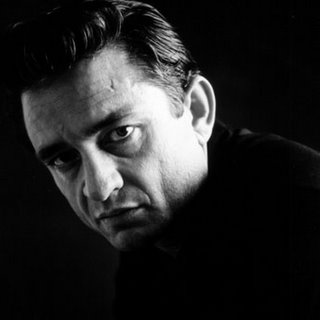
Revelatory, stripped-down tapes from the early 1970s discovered in archive
The legend continues
But Cash, who died in September 2003, never issued any of these intimate performances. The tapes were shelved at House of Cash, where they sat forgotten and undisturbed until 2004, when his son John Carter Cash asked Steve Berkowitz, senior vice president of A&R at Legacy Recordings, Sony BMG's reissue imprint, and producer Gregg Geller for help in cataloging the hundreds of reels stored at the Hendersonville office. "Periodically, I would come across a white tape box with the House of Cash label on it that said 'Johnny Cash, Personal File,'" says Geller. "My sense is he had a concept album in mind, and these tapes were the beginning of that process."
Cash's dream finally comes true with the May release of the two-CD set Personal File, compiled by Geller and featuring forty-nine previously unissued solo Cash tracks, half from July '73 and the rest from similar, later House of Cash demos made in the late Seventies and early Eighties. Personal File arrives at a peak of posthumous Cashmania, fueled by the success of the biopic Walk the Line. The single-CD compilation, The Legend of Johnny Cash, is selling more than 40,000 copies a week, according to SoundScan.
But Personal File delivers a Cash even his most devoted fans have never heard before: at the height of his career and vocal power, telling the story of his life in music, as if he were sitting across from you. "This is his 'Basement Tapes,'" says Berkowitz, "as close as you can get to him singing on the porch." There was no documentation with the original reels to suggest Cash ever submitted them to Columbia, his label at the time. But John Carter Cash recalls his dad referring to these sessions at the time of his first album with producer Rick Rubin, 1994's stripped-back American Recordings. "He talked about how he'd made a record like it in the Seventies," John says, "but nobody was interested in putting it out."
The Personal File tapes were not the only riches buried at the House of Cash, now closed. The tape archive, Geller says, "was a large walk-in closet with, I like to think, virtually every recording that ever passed through his hands," including test pressings of Cash's Sun records and publishing demos by Willie Nelson and Kris Kristofferson. On one visit, Berkowitz noticed towers of unlabeled boxes wrapped in brown paper. Inside were multitrack audio masters from Cash's ABC TV series, The Johnny Cash Show, including unaired songs by guests such as Bill Monroe, Stevie Wonder and Derek and the Dominos. "It is extraordinary," says Berkowitz, who is planning future releases of the material (Sony owns the footage from the show). "You hear Louis Armstrong teaching Johnny to sing [Jimmie Rodgers'] 'Blue Yodel' and Ray Charles trying to teach the Carter Family to sing like the Raelettes."
The two-CD Personal File is just the beginning of what may be a long parade of releases from the Cash archives. In June, Sony is releasing Live in Denmark, a DVD of the Johnny Cash stage revue in the Seventies. And Geller says "the intent is to develop some other projects from, as we call them, 'the Hendersonville tapes.' There are other demos with his band, and there's live material."
"I knew there was treasure there," John Carter Cash says of the House of Cash trove. "But specifics -- that was the mystery of it. My father was creative until the very end of his life. He was genius wherever he went, whatever he did. Luckily, there was a place where this stuff was set aside."



0 comments:
Enregistrer un commentaire